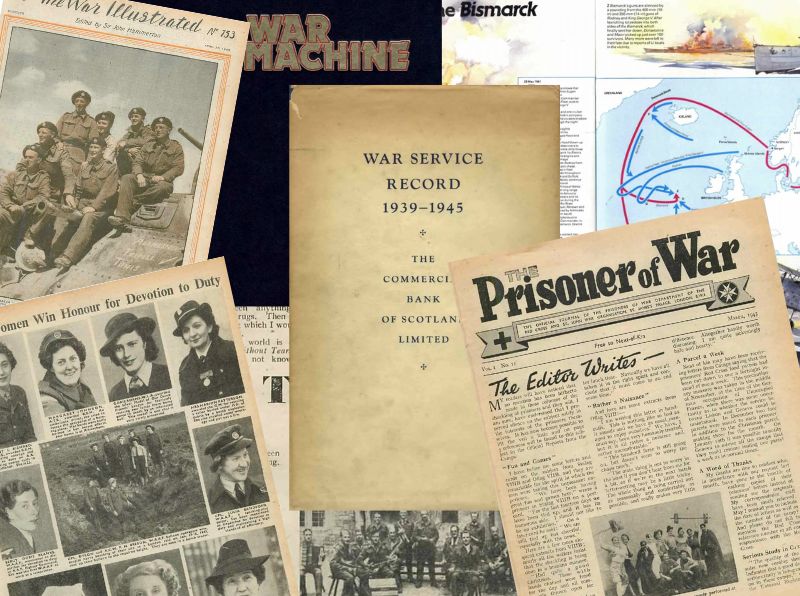Exploring the Historical Documents Library and how it can help you with your military family history
Our Historical Documents Library is a treasure trove waiting to be explored. Our Military Genealogist, Simon Pearce, highlights a selection of his favourite finds from the collection and explains how they can help you with your research, whether you’re a military history enthusiast or a family historian.
What is the Historical Documents Library?
We’ve digitised hundreds of military publications and original wartime newspapers, magazines and journals to help you with your research. Whether you’re researching a person or a topic, you can search the collection for a name or a specific term. You may find a reference to your military ancestor containing new information or useful clues to help you search other records. You could unearth an account of a battle your family member fought in or a detailed description of the equipment or vehicles they operated, helping you better understand their wartime experience.
You can search the Historical Documents Library with the name of a military ancestor, or browse the publications by category and then title.
The Prisoner of War magazine
The Prisoner of War was a magazine produced by the Prisoner of War Department of the British Red Cross and the St. John War Organisation during WWII. Published monthly, it aimed to provide information to the families of British POWs, namely those held in Europe. Articles included prisoners’ letters and articles on camp life, such as sporting events or recreational activities, work assignments, reports of parcels and sometimes, photos of the prisoners. The magazine can help you learn more about the camp your ancestor was held at while revealing unique information about their time as a prisoner; details of which may not make it into traditional POW records.
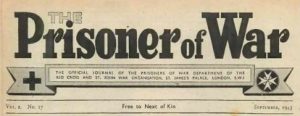
While the information within may be viewed as a slightly sanitised version of conditions and life in the camps, it is nevertheless a valuable source for researching WWII POWs.
FWR Tip: Researching a WWII POW? Our blog on searching for military ancestors in our WWII, Allied Prisoners of War, 1939-1945 collection offers hints and tips on how to get the best out of your research.
Rolls of honour
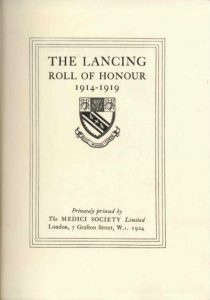
You’ll find a range of rolls of honour within our Historical Documents Library, largely concerning those who lost their lives during the world wars. Some may have been produced by a town or village, a school or university or by a business dedicated to its residents, former pupils or employees who gave their lives during their service.
Many contain biographies of the casualties, offering a fascinating insight into their civilian lives and military service. You may encounter clues within the biography, like a regiment, a date, or a place of service, to help you search for the person in other military collections. Some rolls of honour even contain photos of the service person or first-hand testimonies from comrades or from those who knew them in their civilian lives.
Take, for example, The Watsonian War Record 1939-1945, which documents the service of former pupils of George Watson’s College in Edinburgh. Reading the entry for Peter B.N.S. Prentice, we learn the names of his parents, his address, when, where, and what he studied, as well as details of his military service, all valuable clues for family historians. His biography is also accompanied by a photo, allowing us to put a face to his name.
FWR Tip: Learn more about the Prentice family during WWII through our blog, ‘The Story behind the image’.
First-hand accounts or testimonies found in rolls of honour can be particularly poignant and offer a special insight into the lives of the individual. Wimbledon tennis finalist Kenneth Powell served on the Western Front with the Honorable Artillery Company during WWI and died of wounds in February 1915. His biography appears in the roll of honour of Rugby School, Memorials of Rugbeians Who Fell in The Great War. An extract from the school’s magazine, The Meteor, offers a touching insight into the kind of man Kenneth was, stating:
‘From first to last he was the same entirely simple, straight and unassuming fellow, whom all respected, most liked, and many loved.’
The War Illustrated magazine
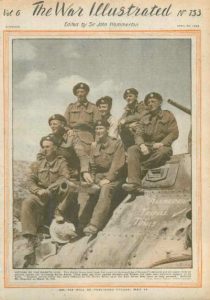
The War Illustrated Magazine was published during both world wars. It documented the events as they unfolded through articles and pictures and told the stories of those who were there, both on the home front and the front lines.
For military family historians, exciting finds are waiting to be discovered, like the honours and awards sections. These pages often contain photos of the medal recipients and a description of their brave deeds. Browsing an issue of the magazine published in April 1943, we discovered a fascinating page with the title ‘These Women Win Honour for Devotion to Duty.’ The numerous brave deeds range from Acting Matron Effie Townend, who was awarded the Royal Red Cross for her work in tending the wounded during the fall of Tobruk in 1942, Margaret Johnson of the Auxiliary Territorial Service, who received the British Empire Medal for attempting to rescue a downed airman from a burning plane and Marion Patterson, Fire Warden, awarded the George Medal for rescuing a sailor buried by the debris of a bomb explosion.
The articles and photos also shed light on the campaigns and battles our ancestors participated in, helping us visualise the terrain, uniforms, equipment, and weaponry.
War Machine magazine
Published between 1983 and 1986, War Machine magazine is dedicated to military vehicles and equipment. It’s a must-read for fans of military history, offering detailed descriptions of anything from ships, tanks and artillery, complete with photographs and sketches. Not only is it a great source for military enthusiasts to get to grips with the vast world of military machinery, but it’s also helpful for those of us researching our military family members. Perhaps your ancestor was part of an Armoured Vehicle Royal Engineers crew during WWII or was transported in a Douglas C-47 aircraft during D-Day. Detailed descriptions of the machinery operated by your ancestors can help you gain a greater understanding of their military service.
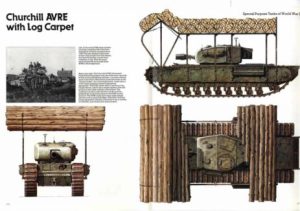
The Historical Documents Library is free for Forces War Records registrants, so why not register today and see what you unearth in this exciting collection?

